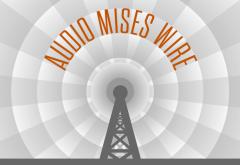It has become a familiar sight over the past decade and a half: a supposedly venerable member of the financial elite tells us with utmost calm that what we think we are seeing isn’t really all that bad. The Fed already knows all about it and has already taken all necessary steps. Further, they are monitoring the situation closely and are ready to make any necessary adjustments with ease and alacrity. Reading the Fed’s meeting minutes and picking through its actual activities reveals a much different picture. They are panicked and pushing every button: upping the federal funds rate, running off the balance sheet (quantitative tightening), maintaining the Fed’s overseas backstopping, and raising the interest rate paid on reserves. Surprise, surprise things are
Topics:
Joseph Solis-Mullen considers the following as important: 6b) Mises.org, Featured, newsletter
This could be interesting, too:
Nachrichten Ticker - www.finanzen.ch writes Die Performance der Kryptowährungen in KW 9: Das hat sich bei Bitcoin, Ether & Co. getan
Nachrichten Ticker - www.finanzen.ch writes Wer verbirgt sich hinter der Ethereum-Technologie?
Martin Hartmann writes Eine Analyse nach den Lehren von Milton Friedman
Marc Chandler writes March 2025 Monthly
 It has become a familiar sight over the past decade and a half: a supposedly venerable member of the financial elite tells us with utmost calm that what we think we are seeing isn’t really all that bad. The Fed already knows all about it and has already taken all necessary steps. Further, they are monitoring the situation closely and are ready to make any necessary adjustments with ease and alacrity.
It has become a familiar sight over the past decade and a half: a supposedly venerable member of the financial elite tells us with utmost calm that what we think we are seeing isn’t really all that bad. The Fed already knows all about it and has already taken all necessary steps. Further, they are monitoring the situation closely and are ready to make any necessary adjustments with ease and alacrity.
Reading the Fed’s meeting minutes and picking through its actual activities reveals a much different picture. They are panicked and pushing every button: upping the federal funds rate, running off the balance sheet (quantitative tightening), maintaining the Fed’s overseas backstopping, and raising the interest rate paid on reserves. Surprise, surprise things are actually not fine, and they know it.
Fed Speak
From the technocratic elite’s perspective, managing a democracy is onerous and tedious. After all, the pesky plebs always demand to know what’s going on and why—as if they could understand!
Indeed, while what is actually going on is not complicated, one suspects the entire reason for the unnecessary opacity and unintelligibility of official policy and discourse is precisely to avoid such accountability.
A look at its most recent minutes shows that the Federal Reserve unanimously approved the following:
- To maintain “standing U.S. dollar and foreign currency liquidity swap arrangements with the Bank of Canada, the Bank of England, the Bank of Japan, the European Central Bank, and the Swiss National Bank.”
- To continue to “conduct overnight reverse repurchase agreement operations at an offering rate of 0.8 percent and with a per-counterparty limit of $160 billion per day”—although that limit, it should be noted, “can be temporarily increased at the discretion of the Chair.”
- To continue to “engage in dollar roll and coupon swap transactions as necessary to facilitate settlement of the Federal Reserve’s agency MBS [mortgage-backed securities] transactions.”
Many more such examples could be given, but the above are representative of Fed speak writ large. In fact, the operations just listed have become mainstays of Fed policy since the great financial crisis.
So What Are They?
In plain English:
- To act as lender of last resort for all dollar-denominated deposits held by institutions in countries the Fed deems of significant importance.
- To buy and then sell back at a set date and price any qualifying security from any qualifying corporation or institution—essentially, a simple forward contract meant to help leveraged operations stay liquid.
- To continue to sell short various portions of its now nearly $3 trillion in MBS holdings—again, an effort to help highly leveraged dealers and traders of these securities stay liquid.
To anyone familiar with the history of money and banking in the United States, and in particular the history of the Fed, its charter, and its series of mandates, something glaring stands out in all of this. See if you can spot the trend:
- The Federal Reserve was only ever tenuously empowered to serve as lender of last resort to US institutions.
- All Fed purchases were statutorily mandated to occur in the open market; that is, at market prices—i.e., not as futures contracts.
- The invocation of the emergency powers granted the Fed by section 13(3) of the Federal Reserve Act is supposed to require transparent reporting to Congress, posting adequate collateral, and temporary assistance only if the Fed expects to be paid back in full.
In short, the newly approved policies represent flagrant overreaches by the Fed in the name of crisis fighting.
And what crisis fighting? The Fed produced asset bubbles in tech and real estate, distorted the bond market, and created the worst inflation in generations.
But as Lev Menand, a former Treasury and Federal Reserve official, detailed in his recent book, The Fed Unbound, since the global financial crisis, the Fed has effectively known no bounds. And since the pandemic, he admits, it has become even worse.
Because unlike the old saw about asking forgiveness rather than permission, the Fed’s approach over the past decade and a half could perhaps best be summed up as “Do whatever you think is best, be evasive, and uncooperative publicly if asked, and then convince Congress to eventually grant you the authority to do what you had been doing all along.”
Exceeding its authority, constantly screwing up, creating more problems, and never being held accountable—the Fed may be a privately run public enterprise, but this sounds like straight-up government work.
Tags: Featured,newsletter








